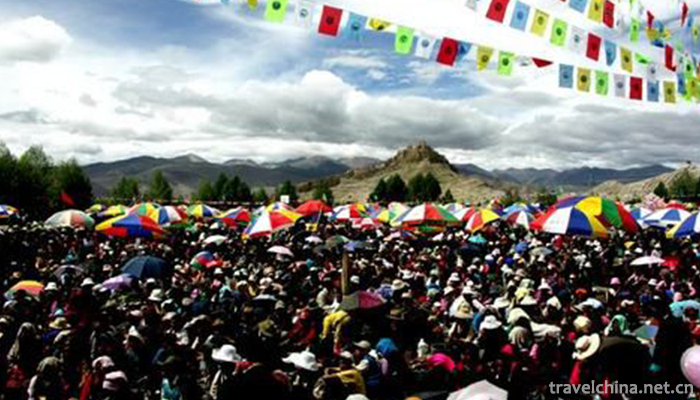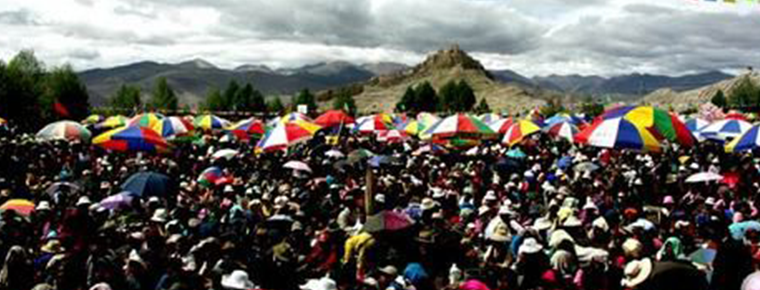Jiangzi dama Festival
Jiangzi dama Festival
Dama Festival: It is a traditional Tibetan program with unique style in Jiangzi area of Tibet. It is said that the first Dama Festival is a horse race and archery competition held to celebrate the completion of Baiju Temple and Octagonal Tower in Jiangzizong Mountain, which has been held since then. The Tibetan calendar, from April 10 to 28, is the traditional festival of the people of post-Tibetan Jiangzi, the Dama Festival, which means horse racing and archery in Tibetan. At that time, the Jiangzi Tibetans will gather at the foot of Zongshan for various colorful sports performances and competitions, and celebrate Dama Festival. Generally, the celebration lasts for a week.
introduce
At the annual "Dama" (meaning horse racing and archery) festival, farmers in Jiangzi, Tibet, rode horses to perform ancient warrior dances.
Dama Festival is a traditional Tibetan festival with a history of more than 600 years. During the Dama Festival, in addition to the mass performances, horse racing, yak racing, horse archery, football, basketball, tug-of-war and other competitions will also be held. Tens of thousands of Jiangzi farmers and herdsmen and urban residents participated in the Dama Festival. The Tibetan calendar, from April 10 to 28, is the traditional festival of the post-Tibetan Jiangzi people, Dama Festival, which means horse racing and archery in Tibetan. Originally popular in Jiangzi, it is now held in many places, but Jiangzi is still the most popular. In the past, the Jiangzidama Festival was held around April 19 of the Tibetan calendar every year. There are horse racing, contest riding, wrestling and other activities, but mainly engaged in religious activities such as Buddha exhibition, divine vault, sacrifice and so on. Now the Dama Festival is mostly held in the idle June. At that time, farmers and herdsmen will gather from all sides in festival dress and joy. The festival includes horse racing, yak racing, archery, football, basketball, tug-of-war, weight-bearing, militia live shooting, professional and mass performances. The young man of the horse race, riding a beautiful plagiarized steed without saddles, whips and whips, gallops and gallops, fights bravely and shows his heroic posture, which makes people exclaim after watching. At the same time, material exchanges should be carried out. State-owned, collective, individual merchants and farmers and herdsmen from all over the country have put a large number of commodities on the market for sale and exchange, and busy scenes everywhere have really played the role of "cultural platform, economic singing".
Historical legends
Legend has it that it began in Jiangzi area. It is said that Papa Bai Sangbu, grandfather of King Jiangzifa's Rongdan Gongsampa, was the Minister of internal affairs of the Sakya Dynasty and King Jiangzifa, and had great prestige among the masses. After Papa Bai's death, his disciples offered sacrifices every year to commemorate his death. After the war, sacrifices were interrupted.
Up to the year of the Tibetan Firerat (1408 Gregorian calendar), King Jiangzifa was appointed around Dangong Sampa and resumed sacrifices in accordance with his father's will. From April 10 to April 27 in the Tibetan calendar of this year, Sampa worshipped his grandfather by chanting sutras. Until 28, entertainment activities began. The main content is the exhibition of Buddhist axis paintings, divine dance and other activities, in addition, there are wrestling, horse racing, holding stones and other recreational activities. All these activities were undertaken by the French king's subordinates, soldiers and servants. Starting from this year, this period is fixed as the annual festival of sacrificial ceremonies. By the time Zhaxi ran around Danpa (1447 AD) and ruled Jiangzi, entertainment was more abundant. In addition to the above, racing horse and archery were added. Hence, Jiangzi's Dama Festival was formally formed.
In the mid-seventeenth century, the fifth Dalai Lama further strengthened the system of unification of politics and religion. After the rule of Tibet, the Tibetan government uniformly appointed monk and secular officials to manage zongxi. The Jiangzi Dama Festival was also hosted by two monk and secular officials appointed by the local government of Tibet, namely, Jiangzi Zongben and Baiju Temple. During this period, the people and horses participating in the horse archery race were apportioned among the three largest nobles in Jiangzi area. At that time, religious activities were only symbolic, mainly for large-scale horse racing and archery competitions, which changed from one day to three days. On the first day, a simple religious ceremony was held, and then the horses were checked and verified, branded and not allowed to change; on the second day, the horse race; and on the third day, archery. After three days of competition, there will be three to four days of suburban banquet activities.
National Folklore
Jiangzi Dama Festival, a 600-year-old festival in Jiangzi County, Tibet, was selected as the National Folklore Festival shortly before the Dama Festival in Jiangzi County. Jiangzi County is located in the upper reaches of Chu River, a tributary of Yarlung Zangbo River. It is one of the top 100 counties in agriculture, a famous ancient heroic city and a famous national historical and cultural city.
It is also known as the "land of cushions" in the world. "Dama" in Tibetan means "running horses and shooting arrows". Nowadays, Dama Festival in Jiangzi County is bringing forth new ideas from the old. While continuing to retain traditional sports and cultural events, it constantly enriches its connotation and forms, and its specifications and grades are getting higher and higher year by year. Jiangzidama Festival has become one of the most important folk cultures in China.
Local people regard Dama Festival as a summer holiday for rest and recreation. On the opening scene of Dama Festival, tens of thousands of people from all over Jiangzi County came to watch Tibetan opera, horse racing and other sports performances. According to the local Tibetan people, as long as they watch horse racing, this roaring horse can take away all their bad luck for a year. Dama Festival was first popular in Jiangzi, but now it is held in many places, but still most popular in Jiangzi, held on July 20 every year. At that time, farmers and herdsmen dressed in festive attire will gather in all directions. The festival includes horse racing, yak racing, archery, football, basketball, tug-of-war, weight-bearing, militia live shooting, professional and mass performances, material exchange and other activities.
Jiangzi Dharma
Jiangzi Dama Festival is a unique folk traditional festival in Jiangzi County. It has a history of more than 600 years. According to legend, during the period of King Sakya, King Pabasambu of Jiangzifa enjoyed high prestige among the masses. After his death, he held many activities on the annual sacrificial day, which continued to form today's Jiangzidama Festival.
Dama Festival is scheduled to be held every year from June 14 to 20 in Tibetan calendar. The main events of the week are folk performances, horse racing, yak racing, horse-riding and shooting races and stone-holding races. The main stadium is located in Jiangzi County Stadium. The stadium became an ocean of tents. During the interval of the competition, Tibetan people from various villages and towns dressed in bright national costumes put up colorful sunumbrellas and tents. Men and women, old and young, sat on the floor, drank butter tea, ate snacks, and had a happy Linka, which was similar to an outing. At the entrance of the stadium, on both sides of the road and on the outdoor space, temporarily set up a booth next to each other, selling farm implements, cosmetics, snacks, drinks, clothing, handicrafts, as well as playing mahjong, Tibetan cards and throwing sieves in tents, which will be very similar to Wuyi Mountain firewood. Dama Festival provides a good opportunity for visiting relatives and friends, promoting friendship, exchanging information and promoting commodity circulation.
Every year there are many traditional ethnic festivals in Tibet, such as the Tibetan New Year, the Wangguo Festival, the Shelton Festival, the Bath Festival and the Jockey Club. Since the establishment of the autonomous region, especially since the reform and opening up, these traditional folk festivals have been well inherited and developed. However, the international anti-China forces and the Dalai clique advocate the theory of "extinction of traditional Tibetan culture". Tibetan traditional culture has not been extinct, and with the development of Tibetan economic construction, it will be better protected and carried forward.


-
1.WeChat
WeChat is a free application that Tencent launched on January 21, 2011 to provide instant messaging services for intelligent terminals
Time 2018-11-13 -
2.China of chunqiu yancheng tourist area
China Spring and Autumn Yancheng Tourist Area (also known as Yancheng, Spring and Autumn Yancheng) is located in the central city of Wujin District, Changzhou City
Time 2018-12-06 -
3.Shahu Sand Lake tourist attraction
In 1996, Shahu Lake was listed as one of the 35 trump-card scenic spots in China. In 2000, Shahu Lake was designated as "National Civilized Tourism Scenic Spot" by the Central Office of Spir
Time 2018-12-12 -
4.Red Liuji Scenic Area
The Red Liuji Scenic Area is located in Liuji Village, Dawang Town. In 1976, the old site of Liuji Branch of the Communist Party of China was declared as a key cultural relic protection unit at the co
Time 2019-01-16 -
5.Jining Beihu Tourist Resort
Jining is the world-famous town of Confucius and Mencius and the capital of the canal. Located 6 kilometers south of Jining City, Shandong Province, Beihu Lake is a new tourist attraction in Shandong
Time 2019-01-21 -
6.Xiling mountain song
Xiling Mountain Song is a national intangible cultural heritage with a long history, primitive simplicity and smooth melody. Its color and mode contain some elements of Tibetan, Qiang and Han folk son
Time 2019-04-19 -
7.Black Tea Production Techniques
Black tea, originally known as "Border Tea", was smuggled across the border by merchants as early as the end of the 16th century. In the Ming Dynasty, black tea was designated as
Time 2019-05-03 -
8.Parrot Opera
Parrot Opera, which originated in the reign of Qianlong in Qing Dynasty, inherited in Shanghe Village, Linzi District, Zibo City, Shandong Province, and is one of the national intangible cultural heri
Time 2019-07-25 -
9.New brown leaf weaving
Xinfang Brown edition is one of the traditional handicraft products in China. It has entered the third batch of national intangible cultural heritage list recommendation project list. It originated in
Time 2019-08-16 -
10.Peking University
Founded in 1898, Peking University was first named as Beijing Normal University Hall. It was the first national comprehensive university in China and the highest educational administrative organ at th
Time 2019-08-30 -
11.Cai Lun
Cai Lun(?-121 years ) Zhong Zhong, a member of Guiyang County in Eastern Han Dynasty. Emperor Ming of Han Yongping entered the palace in the end, Zhang and two years (AD 88). Cai Lun was promoted to t
Time 2019-09-06 -
12.Neijiang ten sages
Ten sages are outstanding representatives of historical figures in Neijiang, which are described as "one division, two phases, three number one scholars and four great masters";
Time 2020-12-16